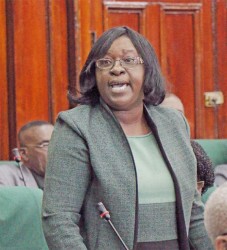Using her inaugural budget presentation to critique government’s plan and programmes for healthcare, APNU Member of Parliament Dr Karen Cummings on Thursday said that the improvement of the primary healthcare system should be the priority rather than secondary projects.
“Pay more attention to primary healthcare, which would have wider scope and greater impact in promoting health and human development rather than the deliberate orchestration to put in place mechanisms to foster the distribution of patronage to those who are perceived to be loyal or satisfy certain prescribed conditions,” Cummings told the National Assembly.
Ignoring the stares of members of on government’s side, who seemed engrossed in her speech yet displeased at the same time, Cummings used data and events to justify her criticisms of the budget, which she said lacked lustre and had omissions. A practising doctor, she made several recommendations for the budget, which she said was “full of ironies and eye-water” and looked dismal and depressing.

After she concluded her presentation, Speaker of the National Assembly Raphael Trotman lauded her, saying that her contribution was one of the best “first timers” he had heard and declared that “A star is born.”
Cummings said that the focus on primary healthcare has been tried and proven to have resulted in healthy people and communities and she believed that this was the strategy for Guyana to achieve the United Nations Millennium Development Goals. She said that it should be complemented by different levels of specialized care whether ambulatory or inpatient.
“This approach has been touted to strengthen society’s ability to reduce inequities, and as an essential condition for meeting commitments, including the United Nations Millennium Declaration …the latter addresses the social determinants of health and the achievement of the highest attainable level of health by everyone,” she asserted.
Cummings pointed out that the budget did not make for the improvement in the socio-economic status of the healthcare providers and that the praxis has shown that carefully designed performance-based approaches can align the incentives of the health workers with the societal goals of improving the population’s health. This, she said, was a prerequisite for Guyana’s development.
She said that healthcare workers were finding it difficult to make ends meet as their wages and salaries were meagre. She informed the MPs that last week about 19 nurses did not report for duty at the Georgetown Public Hospital Corporation (GPHC), owing to the unavailability of money and she called for adequate money to be allocated.
“Monetary motivation is still the preferred manner of encouragement for the healthcare workers, who provide preventive, curative, promotional or rehabilitative health care services in a systematic way to individuals, families or communities,” she stated.
“These healthcare workers look forward to the further 10% after tax increase in their salaries, which had been budgeted for them one year ago… the healthcare workers have been deprived and are still to be paid their earned money. Healthcare workers look forward with great expectation to the said emolument with the requisite interest per annum,” she added.
The APNU parliamentarian pointed out that while government boasts of physical infrastructure expansion, little is done to increase human resources as many of Guyana’s qualified medical personnel are lost to attrition. She cited the high failure rate of local nurses and attributed this to the poor teacher-student ratio. As a result, she recommended that the technical capabilities of healthcare workers be strengthened at all levels, through training and re-training, with the major emphasis being placed on strengthening supervisory skills. Using public statistics on the high maternal and child mortality figures, Cummings pleaded with government to work on bettering ante and neo-natal community healthcare services.
“The construction and outfitting of the proposed maternity waiting homes in Lethem and Bartica is a good gesture. This facility should be more decentralised with trained staff to respond to the growing needs in this area of healthcare service. The nine-bed Dr CC Nicholson Hospital at Nabaclis on the East Coast should be staffed with more midwives to allow for a 24 hour service,” she recommended.
She said too that the proposed specialty hospital at Turkeyen should be put on hold and the focus should be turned to enhancing the GPHC. “The wise thing would be to develop the already and existing tertiary level institution, which will result in less cost to and for the taxpayers,” she said. She also urged the maintenance of specialist programmes done at the GPHC, in collaboration with the University of Guyana and the Vanderbilt and Ohio universities in the USA and the University of British Columbia in Canada, which she noted have begun to train specialists in the areas of Orthopaedics, General Surgery, Internal Medicine, Paediatrics and in Obstetrics and Gynaecology, among other areas. “The remuneration package of such doctors should be attractive-with specialist salaries,” she added.
Cummings reiterated that in her estimation the 2014 budget disregards and has neglected the working poor and vulnerable and attempts to focus on numbers, rather than trying to have a direct impact on the quality of service being rendered to the populace.




